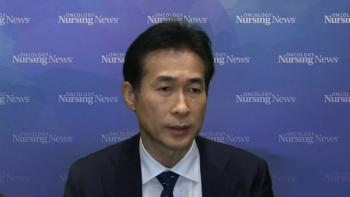
Patients treated with tyrosine kinase inhibitors received olanzapine to address adverse effects including nausea/vomiting, anorexia, insomnia, and weight loss.

Patients treated with tyrosine kinase inhibitors received olanzapine to address adverse effects including nausea/vomiting, anorexia, insomnia, and weight loss.

Findings also suggested that an up-front dose reduction of enfortumab vedotin may benefit older patients with urothelial carcinoma.

With delays in biomarker testing and treatment for metastatic castration-resistant prostate cancer, continued education is needed to address these gaps.

Findings from the ECHELON-3 trial supported the approval of brentuximab vedotin plus lenalidomide and rituximab for relapsed/refractory LBCL.

January's FDA oncology approvals offer new treatment options for breast cancer, mantle cell lymphoma, and other malignancies.

Managing weight loss with telotristat ethyl in patients with metastatic pancreatic ductal adenocarcinoma may improve survival, although further research is needed.

Phone calls to follow up with patients with locally advanced esophageal squamous cell carcinoma while at home may reduce AEs like stomatitis before the first outpatient clinic visit.

Susumu Hijioka, MD, discussed how a lower dose of everolimus may help address certain adverse events like oral mucositis and hypoglycemia.

The 2-year benefit of bevacizumab in colorectal cancer may explain why survival benefits are seen in studies with two-year, but not longer, follow-ups.

Datopotamab deruxtecan-dlnk received approval from the FDA for previously treated unresectable or metastatic, HR-positive, HER2-negative breast cancer.

Findings from an exploratory 2a study showed improvements in patients with cancer cachexia with PH284 compared with placebo.

An APP’s research is focused on chemo-induced peripheral neuropathy in Black breast cancer survivors and its impact on their long-term quality of life.

Oncology nurses and APPs should prioritize active listening and deeper patient engagement to build trusting, long-term relationships with patients with MPNs.

An oncology nurse practitioner's transition from private practice to cancer research offers insights for nurses exploring new career paths within oncology.

Ribociclib plus endocrine therapy shows PFS benefit in luminal B/HER2E breast cancer subtypes compared to chemotherapy, especially with low immune-related gene expression.

The combination of revumenib plus decitabine/cedazuridine showed high rates of remission among patients with relapsed/refractory AML with KMT2Ar, NPM1mt, and NUP98r genetic alterations.

With a link to specific genetic mutations in myelodysplastic syndromes, tobacco smoking may be associated with disease progression and survival.

An expert explained the role oncology nurses and advanced practice providers play in caring for patients with sarcoma during treatment.

Oncology nurses and APPs play a role in supporting caregivers while the patient they care for receives a diagnosis and cancer treatment.

An oncology research nurse balances patient care with rigorous data collection, emphasizing communication and collaboration to advance cancer research.

Amivantamab plus chemotherapy delivered promising OS trends compared with chemotherapy in EGFR-mutant advanced non-small cell lung cancer after disease progression on osimertinib.

For patients with early breast cancer, hypofractionated radiation was noninferior to normofractionated radiation regarding lymphedema risk.

Michael Lai, ARNP, explained the mechanism of action of PARP inhibitors for the treatment of patients with prostate cancer.

Throughout August, the FDA approved drugs for the treatment of diseases including non-small cell lung cancer, cutaneous T-cell lymphoma, astrocytoma/oligodendroglioma, and endometrial cancer.

Emotional intelligence becomes a critical tool for oncology nurses to sharpen when having difficult conversations with patients who received a terminal cancer diagnosis.

The Immune Effector Cell Encephalopathy score and keeping a close eye on patients’ symptoms are critical when monitoring for potential ICANS during lymphoma treatment.

A multidisciplinary approach to adverse effect management addresses many needs patients with gynecologic cancers may have while undergoing treatment.

Although oncology nurses do not relay the initial information around impacted fertility with cancer treatment, they play an important role in guiding patients with any concerns around this topic.

Applying diversity, equity, and inclusion to cancer clinics can help oncology nurses and APPs make an impact on patient care and research.

An expert explained how oncology nurses and APPs should stay informed on the latest genetic mutations that targeted therapies focus in on for non-small cell lung cancer.

Published: January 11th 2025 | Updated:

Published: March 18th 2024 | Updated:

Published: August 16th 2024 | Updated:

Published: April 20th 2021 | Updated:

Published: September 18th 2021 | Updated:

Published: September 12th 2021 | Updated: